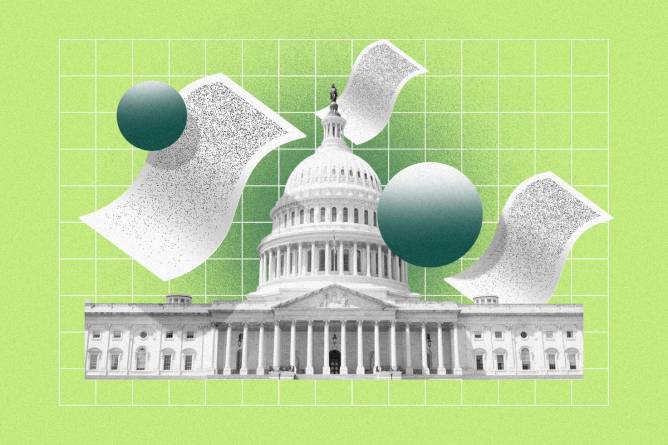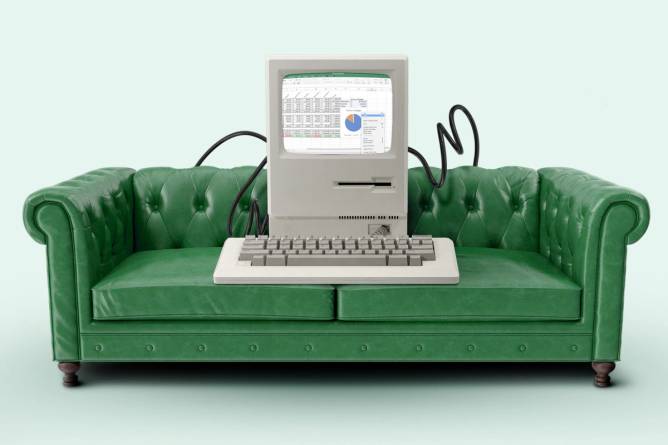Greetings, readers. Have you noticed your Slack looks different today? The company is rolling out a redesign, including a “Later” tab that lets you save everything you’re procrastinating on in one place. Now, about that 2 pm deadline…
In today’s edition:
 On the move On the move
 Legislative lowdown Legislative lowdown
 Hiring for healthcare Hiring for healthcare
—Kristen Parisi, Courtney Vinopal, Kristine White
|
|
Francis Scialabba
There’s been a plethora of recent shakeups in HR departments, including some big-name departures. Here are some of the latest moves in an industry that hasn’t had a dull moment in 2023.
AT&T. Angela Santone, senior executive VP of HR, will leave the company at the end of September, Bloomberg reported. She joined AT&T in 2019 as chief administrative officer and has since made cultural changes to increase employee engagement.
Disney. Latondra Newton, who ran DE&I at Disney for more than six years, left the company in June, according to Reuters. While the company searches for a replacement, Julie Merges, SVP of talent acquisition, will manage Newton’s direct reports.
Lumen Technologies. Ana White will join Lumen Technologies as EVP and chief people officer on September 1, the data management company announced in a press release. She brings decades of experience in the tech industry, including at tech security firm F5 and Microsoft.
Salesforce. Brent Hyder, Salesforce’s chief people officer since 2019, will reportedly depart the company after a tumultuous year marked by downsizing the company’s global workforce by 10%, as well as offensive comments he made during Pride month, according to Insider.
Keep reading here.—KP
|
|
Working in HR is about people, right? Well, that’s where AI comes in. Turns out that HR pros can use AI and machine learning to improve the employee experience—and make their own jobs easier.
Workday breaks it all down in their new report, How AI and Machine Learning Empower HR. They examine the difference AI and machine learning can make for your org—and how Workday is already providing this cutting-edge tech.
Here’s a peek into what HR tech can do for your org:
- improve the ROI of people and business investments
- equip employees with the necessary tools and knowledge to support their entire employee life cycle
- help you deliver meaningful, personalized, inclusive, and impactful people strategies
It’s time for HR to embrace a human-centered approach to AI. Download the free report.
|
|
Francis Scialabba
The National Labor Relations Board (NLRB) recently adopted a new standard that will likely prompt HR departments to review their workplace handbooks. Here’s what people pros should know about that new policy, plus state laws on marijuana employment screenings.
NLRB adopts a new legal standard on work rules. On Aug. 2, the labor board overruled a Trump-era decision that made it easier for employers to maintain policies restricting workers’ ability to, for example, record meetings or use social media. In a statement, NLRB Chairperson Lauren McFerran said the previous standard, which drew from a decision allowing Boeing to uphold a no-camera policy on its sites, “gave too little consideration to the chilling effect that work rules can have on workers’ Section 7 rights,” referring to the provision of the National Labor Relations Act that allows workers to organize and bargain collectively.
Under the new standard, “if an employee could reasonably interpret the rule to have a coercive meaning,” then NLRB General Counsel Jennifer Abruzzo will have met the burden to prove it has a “reasonable tendency” to chill workers from exercising their federal labor rights, per the NLRB’s decision. The decision has the potential to “invalidate countless workplace rules” of private-sector employers, David Pryzbylski, an attorney with Barnes & Thornburg, predicted in an SHRM interview.
HR pros are being advised to review their handbooks to ensure the rules they have in place are compliant with the new standard.
Keep reading here.—CV
|
|
Pam Zients
Pam Zients is a Denver-based partner at recruiting firm Chasm Partners. Her firm helps healthcare companies find and hire candidates for executive positions. Some of Chasm’s clients include pharmacy provider Aspen RxHealth, healthcare software company Iodine, and the New York City-based Mount Sinai Health System.
Zients discusses what her job is like and her transition into healthcare recruiting.
How would you describe your job to someone who doesn’t work in healthcare?
I happen to be a partner at a firm where we only work with healthcare companies, so my background is years and years in healthcare. But most people know what an executive search firm does. We used to be called “headhunters,” and people still call it that.
The way I would describe it in terms of healthcare specifically though is that we work with growing healthcare companies—usually they are venture capital or private equity-backed—and we help them find top talent that is going to fuel their growth and ability to scale profitably. We all know that human capital is probably the most important thing that can make or break a company. Who you hire is critical, and getting those hires right is also critical, because I think a lot of people don’t realize the cost of mis-hires is very high.
Keep reading on Healthcare Brew.—KW
|
|
TOGETHER WITH CAREERBUILDER
|
|
Budget smarter, hire faster. Connect with the most competitive candidates with Pay Per Resume from CareerBuilder. With Pay Per Resume, you can bulk-download resumes with a one-time delivery or keep a steady stream of new resumes coming in. Set your desired budget and watch the resumes pour in.
|
|
Francis Scialabba
Today’s top HR reads.
Stat: Productivity among data-entry workers in India dropped by 18% for employees who were randomly assigned to work from home, compared to those who worked in the office. (National Bureau of Economic Research)
Quote: “When people work together, it creates an invisible web of social connections between coworkers…When that’s broken apart as a result of layoffs, that creates a psychological impact.”—Sima Sajjadiani, assistant professor at the University of British Columbia’s Sauder School of Business, on how layoffs affect employees who remain at a company (BBC Worklife)
Read: WeWork’s stock dropped by 26% after the coworking company expressed “substantial doubt” about its ability to stay in business and hinted at the possibility of bankruptcy in a filing. (CNBC)
Stress less: Make workforce mental health a priority with info from Calm’s new Harvard Business Report. Learn how Ogilvy and Zendesk are reinventing work to support mental health + say no to workplace stress.*
*This is sponsored advertising content.
|
|
Looking to make your next career move? iHireHR has 30k+ handpicked jobs for HR pros and easy-to-use tools so you can search and apply from anywhere. Explore opportunities in the following areas:
|
|
|








